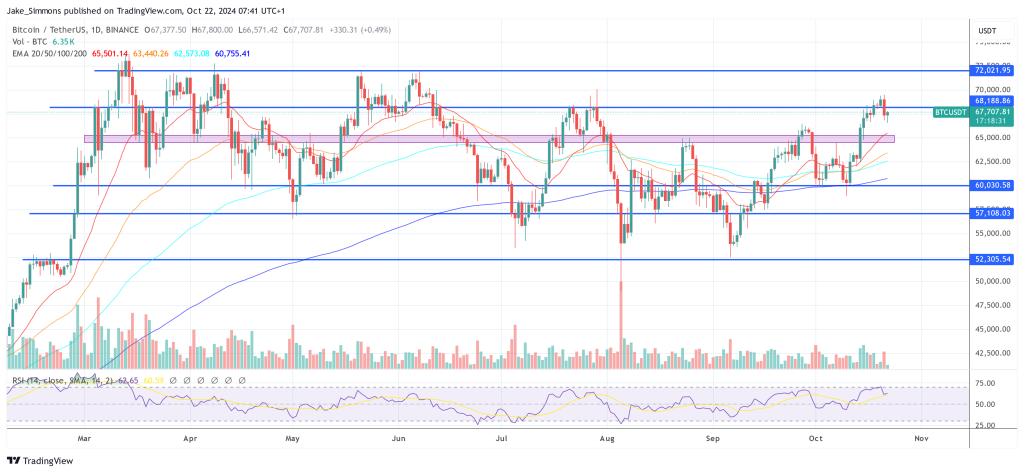In a recent interview with journalist Madison Reidy, Michael Saylor, CEO of MicroStrategy, stirred a massive controversy within the Bitcoin community with his remarks on custody and regulation. The discussion centered around the risks associated with large institutions holding significant amounts of BTC and the potential for government seizure or confiscation, reminiscent of historical events like the gold confiscation under Executive Order 6102 in 1933.
When questioned about the risks of having a significant amount of BTC held by third-party custodians and large institutions, Saylor dismissed concerns of increased seizure or confiscation. He argued that BTC is safer in the hands of regulated public entities like BlackRock, Fidelity, and JP Morgan than with unregulated private holders. Saylor suggested that when Bitcoin is held by “crypto anarchists” who operate outside of government regulations and tax systems, it poses a greater risk of government intervention.
“I think it’s the opposite. I think that when Bitcoin is held by a bunch of crypto anarchists who aren’t regulated entities, who don’t acknowledge government or don’t acknowledge taxes or don’t acknowledge reporting requirements, that increases the risk of seizure.”
He emphasized that regulated institutions provide stability and trustworthiness. “When you have regulated public entities like BlackRock, Fidelity, JP Morgan, and State Street Bank holding the asset, all the lawmakers and all the law enforcement arms are invested in those entities. There’s no way that all the senators and all the congressmen are going to seize the assets from Fidelity and BlackRock or Vanguard because that’s where all their retirement money is invested.”
Reidy brought up the gold confiscation under Executive Order 6102 during the Great Depression as a historical precedent for potential government seizure. Saylor dismissed this comparison, labeling it a “myth and a trope” propagated by paranoid “crypto anarchists.” He contended that the circumstances are fundamentally different because, at that time, the US was on the gold standard, and the government needed to control gold to devalue the dollar.
“Today, we’re not on the gold standard or the Bitcoin standard,” Saylor stated. He argued that the US government has no incentive to seize BTC held in custody any more than it would seize stocks or real estate. “I don’t think we have to worry about Bitcoin held in custody being seized by the government any more than you have to worry about your Apple stock being seized by the government,” Saylor claimed.
Bitcoin Community Backlash
Saylor’s remarks did not sit well with many in the Bitcoin community, who value decentralization and self-custody as core principles. Jack Mallers, CEO of Strike, responded on X: “Calling self-custody ‘crypto-anarchism’ oversimplifies what Bitcoin accomplishes. It’s about freedom—freedom of speech, property rights, and protecting your right to own what’s yours. We must not dismiss it because freedom isn’t promised—it must be fought for and protected.”
He acknowledged his respect for Saylor but emphasized the importance of diverse views in a free market. “My goal is simply to defend the principles that I believe make Bitcoin powerful: freedom and the ability for anyone to engage with it however they see fit,” Mallers added.
Sina Nader, co-founder of 21st Capital, criticized Saylor’s position: “Terrible look for Saylor to become a shill for the government and banking system and call true Bitcoiners paranoid. Saylor is on a mission to relegate Bitcoin into an investment pet rock and halt its usage as a currency.”
Samson Mow, CEO of JAN3, warned: “A government doesn’t need to physically confiscate your Bitcoin. It can just lock custodial BTC into approved custodians forever, aka ‘Institutional Bitcoin.’ While a government that isn’t on a Bitcoin Standard technically shouldn’t have incentive to confiscate BTC, it actually does still have an incentive to degrade and attack Bitcoin.”
Mow suggested that governments might seek to undermine Bitcoin because it represents a “harder and superior money” that could diminish the value of fiat currencies. He urged the community to “plan accordingly” with a self-custody solution and “expect [a] 6102,” referencing the historical executive order.
At press time, BTC traded at $67,707.












